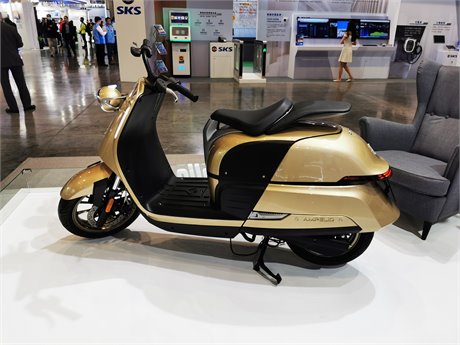By Jeremy Rose
If I needed confirmation that Taiwan has morphed from the Bicycle Kingdom to the Scooter Kingdom I got it at the at the Net Zero City Expo that opened in Taipei this week.
There was just one bicycle on display – an Ubike which I’ve already written about – but literally dozens of e-scooters.

Currently there are nearly 600,000 e-scooter owners in Taiwan out of a total of about 5 million scooter riders.

And the scooters aren’t just for personal use. There were delivery scooters on display, and even e-trikes for bigger packages.

The last time I wrote about Gogoro scooters – that account for 90% of the e-scooters on Taiwan’s roads – I forgot to point out that the battery swap system acts a bit like a cellphone account with users being able to opt for different plans depending on how much they ride.
So despite Taiwan’s status as a bicycle manufacturing superpower, the bicycle seems to have only a very minor part to play in the country’s plans to become net zero by 2050.
As I’ve mentioned before, most people put that down to the heat. But Meling, a keen recreational cyclist, told me that was rubbish.
The hellishly dangerous nature of Taiwan’s urban streets is the main obstacle to people jumping on their bikes, she said.
Cycling, she said, is actually very popular in Taiwan. But it’s recreational cycling outside of the cities or on the few scenic bike paths that exist in the urban centres.
Nearly 3000 people die in traffic accidents each year in Taiwan. Adjusted for population that would be around 650 in New Zealand, close to double the actual figure of 378 in 2022. A statistic experts agree is appallingly high by international standards.
A popular Taiwanese Facebook page has declared Taiwan “a living hell for pedestrians.” And as bad as it is for those on foot, it’s worse for cyclists who often have to compete for road space with a fast-flowing tide of scooters, cars and trucks.
Fast charge e-buses
Possibly the most common e-vehicle you see on the streets of Taipei – other than e-scooters – is e-buses.
Local bus manufacturer Master Transportation Bus LTD had a stand at the expo. It claims its buses can be charged from 20 – 80% in just 15 minutes and can travel up to 400km per day.

When it comes to cars, in Taiwan two things have surprised me. The low number of EVs and the average size of the cars.
It’s rare to see the likes of Suzuki Swifts in Taiwan: the cars here are big. There’s no equivalent of China’s Wuling Hongguang Mini EV.
Teslas seem to be making inroads into the taxi market. Two of my 10 taxi rides have been in Teslas.

Other Taiwanese innovations on display at the expo were a new type of transparent solar panel which its manufacturer claims will be suitable for both roofs and cladding.

And an intriguing display of a “biosolar green roof system integrated with wind power waterfall.” Sadly there was no one available who spoke sufficient English to explain exactly what that meant.

An AI security camera system correctly determined my gender and flattered me by declaring I was 47 – out by a decade.

And I was left to ponder the purpose Proactive Cyber Defence stand with its fairground attraction-like ball throwing game.

Business class on a fast train
It’s not often I’m in a position to opt for business class. But I decided it was worth splashing out an extra $29 to experience the difference on my return journey from Taichung to Taipei.
The experience reminded me of a story I read in an economics book about how the French railways introduced a roofless third class carriage despite it costing more to build than the enclosed one.

The existence of a very undesirable third class carriage enabled the French railway company to charge more for second and first class tickets.
It feels like something similar might be going on with Taiwan’s High Speed Rail. The only real differences between economy and business class are softer seats and a complimentary coffee and biscuit.
………………………..
Jeremy Rose is currently in Taiwan and travelled there with assistance from the Asia New Zealand Foundation.
- SEO Powered Content & PR Distribution. Get Amplified Today.
- Platoblockchain. Web3 Metaverse Intelligence. Knowledge Amplified. Access Here.
- Source: https://www.carbonnews.co.nz/story.asp?storyID=27355




